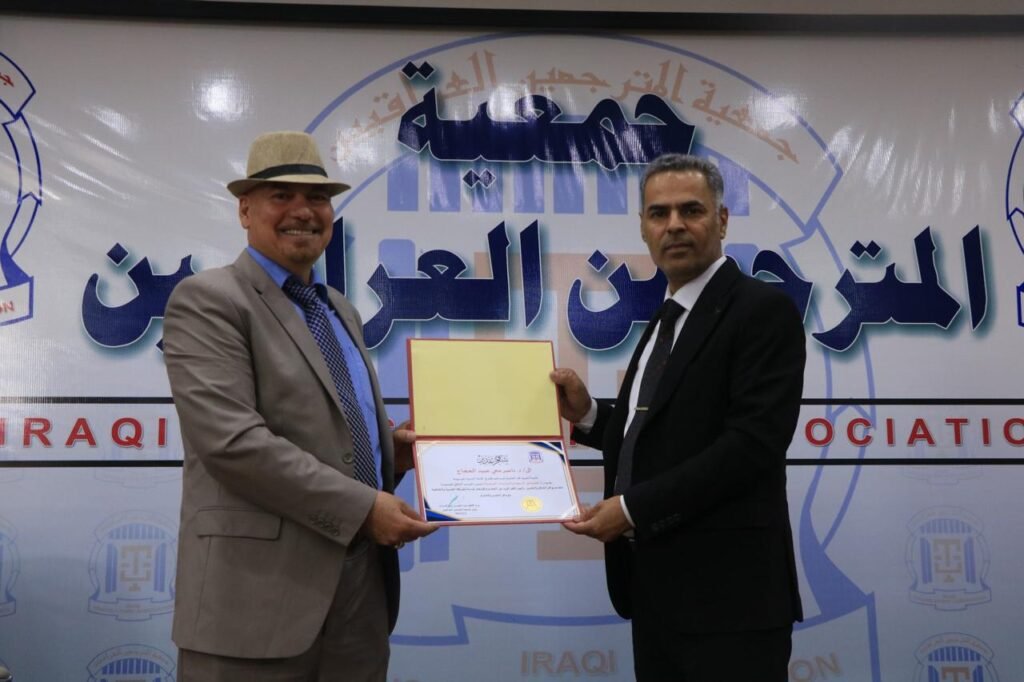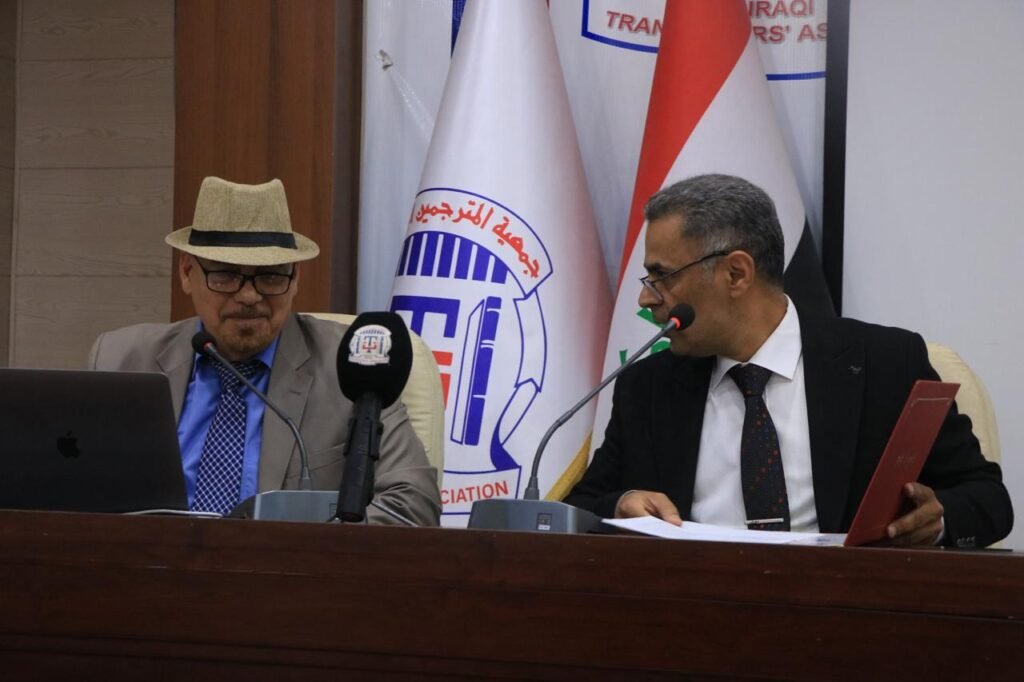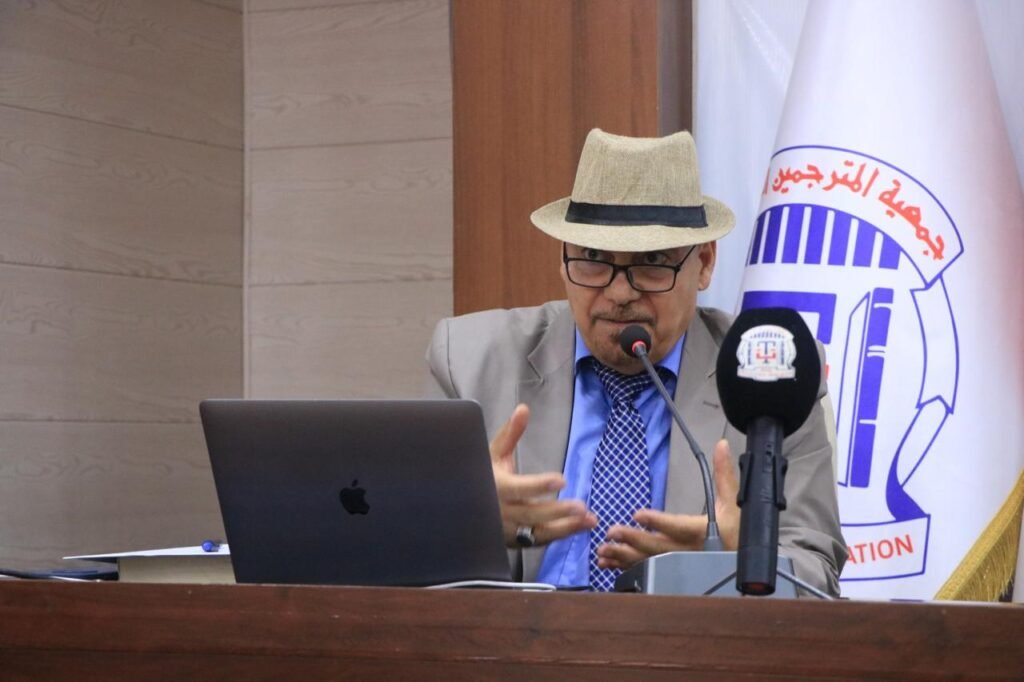- By admin
- In News



Vernacularism in the AI Age: Iraqi Translators Association Hosts Groundbreaking Symposium on Language, Culture, and Technology
Baghdad, May 3, 2025
In a landmark intellectual gathering, the Iraqi Translators Association (ITA) held a symposium today that ignited rich discussion on Vernacularism as a paradigm for understanding language, identity, and cultural ethics in the AI age. Moderated by ITA President Dr. Kadhim Abdul Hassan, the event drew a diverse and engaged audience of linguists, translators, educators, and students eager to explore how local languages and cultural expressions – once marginalized – can shape the future of artificial intelligence, natural language processing (NLP), and human-centered technologies.
The symposium, led by Dr. Nasser Hajjaj, a pioneering scholar in Arabic linguistics and author of Arab Vernacularism (2024), introduced key concepts such as vernaculate (to translate into vernaculate), vernaculation (the act/process of integrating vernacular elements into broader discourses), and the newly coined term “Maḥlalah” – مَحلَلةa morphological innovation that encapsulates the process of vernacular transformation in Arabic and global contexts.
Dr. Hajjaj, who’s also the editor-in-chief of Mesopotamian Journal of Arabic Language Studies MJALS, emphasized the urgency of embracing vernaculars not only as cultural artifacts but as living systems of thought that AI must learn to understand. “Vernaculars are not deviations from an idealized standard – they are the soul of a people’s lived experience. Ignoring them in NLP and AI design is both a technological failure and an ethical one,” he stated.
In a bold and forward-looking proposition, Dr. Hajjaj called for a shift beyond conventional Natural Language Processing (NLP) towards a more profound model he terms Deep Vernaculation Processing (DVP) – عملية المُحلَّلة العميقة. DVP aims to enable AI systems to go beyond surface-level language comprehension and dive into cultural nuances, symbolic associations, idiomatic richness, and contextual semantics that define human vernaculars. “DVP is not just a technical advancement -it’s a cultural awakening for AI,” he said. “Only through DVP can machines begin to understand not just what we say, but what we mean within our cultural worlds.”
The symposium tackled pressing questions in the intersection of language and technology, including:
- How can Cultural AI better represent diverse linguistic realities?
- What ethical frameworks can guide AI to avoid cultural erasure?
- Why do state institutions continue to suppress vernacular usage in education and media?
- Can Human-Centered AI (HCAI) be truly inclusive without embracing the local tongues of people?
Audience members posed powerful questions and offered insightful feedback, particularly on the political and psychological impact of suppressing vernaculars in Iraq and the broader Arab world. Many participants shared real-life challenges of translation and cultural mediation in the digital age, revealing gaps in AI systems trained only on Modern Standard Arabic (MSA) or globalized English.
The discussion culminated in a passionate call to action:
- Encouragement of Iraqi linguists and translators to contribute to the development of AI systems – including machine translation, voice recognition, and chatbot technologies – that reflect Iraq’s rich vernacular landscape.
- A proposal for Iraqi universities to establish new academic departments – such as the Department of Vernacularism or Department of Vernacular Studies – to institutionalize research in this emerging field and support the next generation of scholars and developers.
- Investing in DVP research and application as the next frontier of AI capable of engaging with cultural, historical, and emotional depth – especially in contexts like Iraq where meaning is often carried in poetic, religious, and idiomatic vernaculars.
The symposium marked a turning point in recognizing Iraq not just as a cradle of linguistic heritage, but as a potential leader in global discourse on ethical and inclusive AI. As one audience member noted, “We’re not just translating words anymore – we’re translating worlds.”
With the success of this event, the Iraqi Translators Association reaffirmed its commitment to fostering innovative research and dialogue, standing at the frontier where language, technology, and cultural justice intersect. The seeds of Maḥlalah and Deep Vernaculation Processing have been planted – what grows from here may reshape how the world speaks, listens, and understands.
المحلية في عصر الذكاء الاصطناعي: جمعية المترجمين العراقيين تنظم ندوة رائدة حول اللغة والثقافة والتكنولوجيا
بغداد، 3 مايو 2025 ـ
ضمن حضور ثقافي وفكري بارز، نظمت جمعية المترجمين العراقيين (ITA) اليوم ندوة أثارت نقاشاً غنياً حول المحلية (Vernacularism) كإطار منهجي فكري شامل (paradigm) لفهم اللغة والهوية والأخلاقيات الثقافية في عصر الذكاء الاصطناعي.
أدار الندوة رئيس الجمعية الأستاذ كاظم عبد الحسن، بحضور جمهور متنوع من اللغويين والمترجمين والتدريسيين والطلاب المهتمين بكيفية تأثير اللغات المحلية والتعبيرات الثقافية - التي كانت مهمشة في السابق - على تشكيل مستقبل الذكاء الاصطناعي ومعالجة اللغة الطبيعية (NLP) والتقنيات التي تركز على الإنسان.
الندوة التي حاضر فيها الدكتور ناصر الحجاج، الباحث الرائد في اللغويات العربية ومؤلف كتاب المحلية العربية (2024)، ورئيس تحرير مجلة بلاد ما بين النهرين لدراسات اللغة العربية، قدمت مفاهيم رئيسية مثل الترجمة المحلية (vernaculate/vernaculation) أي الترجمة إلى اللغة المحلية، أو ما سمّاها الحجاج بـ (المَحْللة) أي العملية التي يتم من خلالها توظيف ودمج العناصر المحلية في الخطابات الأوسع، والمصطلح الجديد "محللة" (vernaculation) وهو ابتكار صرفي يعكس عملية التحول اللغوي المحلي في السياقات العربية والعالمية.
وأكد الدكتور الحجاج على ضرورة تبني المحلية ليس فقط كأداة تأكيد الهوية الثقافية، بل كنظام حي من التفكير الإنساني يجب على الذكاء الاصطناعي أن يتعلم فهمه، موضحا أن "المحليات ليست انحرافات عن القواعد والمعايير النموذجية أو الرسمية، بل هي روح التجربة الحياتية للناس وأساليبهم المعيشية، وأن تجاهلها في معالجة اللغة الطبيعية (NLP) وتصميم الذكاء الاصطناعي هو فشل تقني وأخلاقي على حد سواء".
وفي اقتراح جريء يفتح آفاقا مستقبلية، دعا الدكتور الحجاج إلى التحول من معالجة اللغة الطبيعية (NLP) التقليدية نحو نموذج أعمق سمّاه عملية المحللة العميقة (DVP). تهدف عملية المحللة العميقة إلى تمكين أنظمة الذكاء الاصطناعي من تجاوز فهم اللغة السطحي والغوص في الفروق الثقافية، والروابط الرمزية، والغنى التعبيري، والسمات الدلالية السياقية التي تحدد اللغات المحلية. مبينا أن "عملية المحللة العميقة ليست مجرد تقدم تقني - إنها يقظة ثقافية للذكاء الاصطناعي. وأنه فقط من خلال عملية المحللة العميقة يمكن للآلات أن تبدأ في فهم ما نقوله، ولكن الأهم من ذلك، ما نعنيه داخل منظوماتنا وبيئاتنا الثقافية".
ناقشت الندوة العديد من الأسئلة الملحة في تقاطع اللغة والتكنولوجيا، بما في ذلك:
- كيف يمكن للذكاء الاصطناعي الثقافي (Cultural AI) أن يمثل بشكل أفضل الواقع اللغوي المتنوع؟
- ما هي الأطر الأخلاقية التي يمكن أن توجه الذكاء الاصطناعي لتجنب محو الثقافة؟
- لماذا تواصل المؤسسات الحكومية قمع استخدام المحليات في التعليم والإعلام؟
- هل يمكن للذكاء الاصطناعي الذي يتمحور حول الإنسان (HCAI) أن يكون شاملاً حقاً دون تبني اللغات المحلية للشعوب؟
طرح الحضور أسئلة مهمة وقدّموا ملاحظات دقيقة، بخاصة حول التأثيرات السياسية والنفسية لقمع اللغات المحلية في العراق والعالم العربي. وتناول العديد من الحضور التحديات الحقيقية في الترجمة والتواصل الثقافي في العصر الرقمي، مما كشف عن الفجوات في أنظمة الذكاء الاصطناعي المدربة فقط على اللغة العربية الفصحى أو الإنكليزية العالمية. وتوجت النقاشات بتوصيات هامة للعمل على:
- تشجيع اللغويين والمترجمين العراقيين للمساهمة في تطوير أنظمة الذكاء الاصطناعي، بما في ذلك الترجمة الآلية، وتقنيات التعرف على الصوت، وتقنيات الدردشة التي تعكس البيئات الطبيعية اللغوية المحلية في العراق.
- اقتراح إنشاء أقسام أكاديمية جديدة في الجامعات العراقية؛ مثل قسم الدراسات المحلية، أو قسم المحليات العراقية، لبناء أسس قوية تمهيدا للارتقاء بمستويات البحث في هذا الحقل العلمي الناشئ، ودعم الجيل القادم من العلماء والمطورين.
- الاستثمار في أبحاث وتطبيقات عملية المحللة العميقة كأفق جديد للذكاء الاصطناعي القادر على التفاعل مع العمق الثقافي والتاريخي والعاطفي، خاصة في بيئة حضارية مثل العراق، حيث تحمل المعاني اللغوية أبعادها الرمزية والبلاغية الأعمق في التعابير المحكية، محلياتها الشعرية، والثقافية والدينية، وفي شوارد اللغة المحلية (idioms) ورمزيتها.
أجمع الحضور على أن الندوة مثلت نقطة تحول في الاعتراف بالعراق ليس فقط كمهد للتراث اللغوي، ولكن أيضاً كقائد مستقبلي للخطاب العالمي في مجال الذكاء الاصطناعي الأخلاقي والشامل. كما قال أحد الحضور: "من خلال المحلية لم تعد الترجمة مجرد نقل للكلمات ومعانيها، بل صارت نقلاً ثقافياً للعوالم الإنسانية والوجودية والهويات".
وبنجاح هذه الفعالية، جددت جمعية المترجمين العراقيين التزامها بتعزيز البحث والحوار المبتكر، والوقوف في طليعة حيث تلتقي اللغة والتكنولوجيا والعدالة الثقافية. تم زرع بذور المحيلة، وعملية المحللة العميقة، وما سينمو بعدها قد يعيد تشكيل كيفية التحدث والاستماع وفهم العالم.